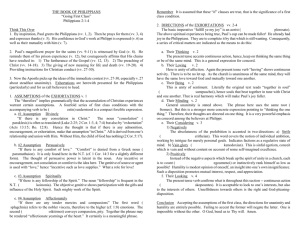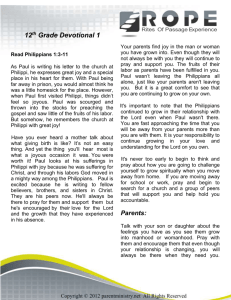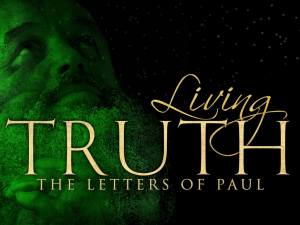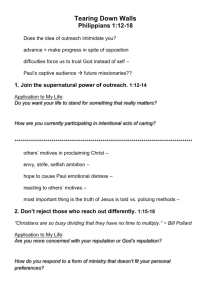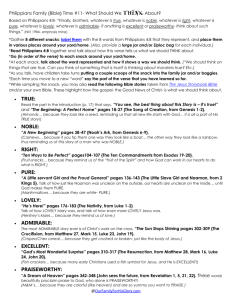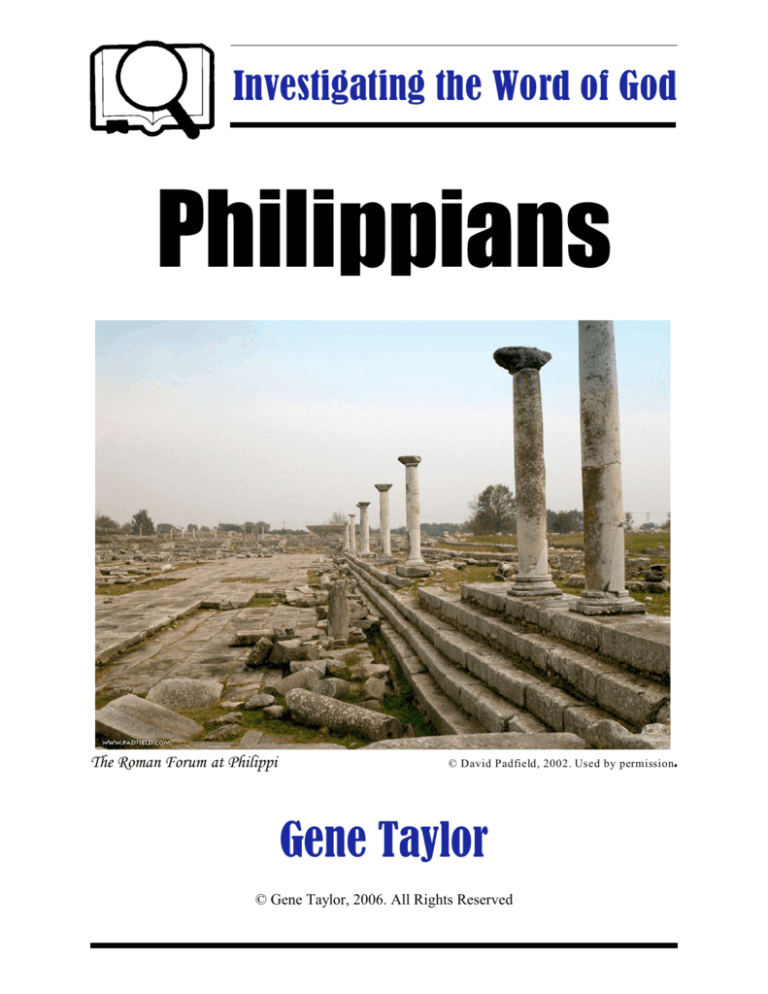
Investigating the Word of God
Philippians
The Roman Forum at Philippi
© David Padfield, 2002. Used by permission.
Gene Taylor
© Gene Taylor, 2006. All Rights Reserved
An Introduction to Philippians
The City of Philippi
Philippi was located on a
fertile plain about nine miles
from the Aegean Sea,
northwest of the island of
Thasos. The city of Neapolis
served as its seaport.
Philippi was in the midst of
a very fertile territory.
Originally it was a Phoenician
mining town because it was
close to the gold mine located
in the mountains and on
Thasos.
In 358 B.C., Philip of Macedon, father of Alexander the Great, from whom the city received its
name, took the city from the empire of Thrace to whom it originally belonged. The Romans won
it in battle from the Greeks. As a Roman colony, it grew in prominence because it was on the Via
Egnatia, the main road from Rome to the province of Asia. Its inhabitants were Roman citizens
who not only had the right to vote but also to govern themselves. In New Testament times it was
regarded as “the foremost city of that part of Macedonia, a colony” (Acts 16:12), even though the
city of Thessalonica was actually the capital of the Roman province of Macedonia. The status of
being a Roman colony was a distinction in which its citizens took a great deal of pride which
might explain their complaint against the apostle Paul for seeking to introduce customs and
practices contrary to those of the Romans (Acts 16:21-26).
Evidently it did not have a large Jewish population. This is seen in the fact that there was not a
synagogue there. Some scholars have suggested a strong anti-Semitic (A hatred of the Jews - GT)
attitude existed there because large numbers of Jews were normally found in other Greek cities—
Thessalonica, Berea, Athens, and Corinth.
The Church in Philippi
The church at Philippi was established by the apostle Paul on his second preaching journey about
52 A .D . He had set out from Antioch of Syria and had traveled by land to revisit the churches he
had established on his first journey. Timothy joined him at Lystra. Having gone through “Phrygia
and the region of Galatia, they were forbidden by the Holy Spirit to preach the word in Asia.
After they had come to Mysia, they tried to go into Bithynia but the Spirit did not permit them.
So passing by Mysia, they came down to Troas. And a vision appeared to Paul in the night. A
man of Macedonia stood and pleaded with him, saying, ‘Come over to Macedonia and help us.’
Now after he had seen the vision, immediately we sought to go to Macedonia, concluding that the
Lord had called us to preach the gospel to them. Therefore, sailing from Troas, we ran a straight
course to Samothrace, and the next day came to Neapolis, and from there to Philippi, which is the
foremost city of that part of Macedonia, a colony. And we were staying in that city for some
days” (Acts 16:6-12).
Investigating the Word of God: Philippians
Gene Taylor
-1-
God had guided Paul to Philippi. God had prevented him from speaking the word in Asia, Mysia,
and Bithynia. He had given him the vision at Troas. A ship was immediately available. A
favorable wind speeded them on their way. Sailing from Troas, they crossed the Aegean Sea to
Neapolis, Philippi’s seaport, in two days, a journey that would ordinarily have taken five days.
Since there was no synagogue in the city, on the Sabbath Paul found a group of women meeting
for prayer by the side of the river. There he preached the first gospel sermon on the European
continent (Acts 16:13). In response to that sermon, Lydia, a seller of purple from the city of
Thyatira, along with her household, believed and was baptized (Acts 16:12-15). Her home
became the base of Paul’s operations in the city (Acts 16:15). It also seems the young church met
in her home (Acts 16:40).
Having cast a demon that enabled her to tell fortunes out of a slave girl, her masters brought Paul
and his preaching companion Silas before the city’s rulers and falsely accused them (Acts 16:2021). They were beaten and cast into prison (Acts 16:22-23). At midnight, with their feet securely
fastened in stocks, Paul and Silas were singing hymns (Acts 16:25). An earthquake shook the
foundations of the prison, opened the doors and loosed the chains from the walls (Acts 16:26).
The jailor, fearful that his prisoners had escaped, was about to commit suicide when Paul stopped
him and told him that none of the prisoners had escaped (Acts 16:27-28). The jailor and his
household were taught and baptized by Paul (Acts 16:29-34). Paul and Silas were released from
prison the next day (Acts 16:36). Before they were released, Paul tells that both he and Silas had
Roman citizenship and should not have been beaten (Acts 16:37). The magistrates became afraid
and came and pleaded with Paul and Silas and asked them to leave the city (Acts 16:38-39). They
go to Lydia’s house, encourage the brethren there, and then depart the city (Acts 16:40).
When Paul left Philippi, Luke, who had joined him in Troas (Acts 16:8, 11, 40), remained there
to further aid in building up the church. Silas later visited Philippi (Acts 18:5). Paul also later
revisited the city on at least two occasions (2 Corinthians 2:13; Acts 20:6).
Perhaps no other local church enjoyed such an intimate relationship to the apostle Paul as did the
church in Philippi. By their support of his work, they had made for themselves a special place in
his heart. He loved them (1:8) and would never forget their many acts of gracious kindness on his
behalf (4:1).
The church at Philippi seemed to have very few problems and very little trouble. It seemed to be
filled with goodness and love. It held a keen interest in Paul. Paul had no special admonitions to
this church as a whole because, apparently, there were no real difficulties in it. William S. Deal
said of it, “This church continued to flourish on into the second century A .D .” (Baker’s Pictorial
Introduction to the Bible, 358).
Author, Date, Place of Writing and Messenger
The writer clearly identifies himself as “Paul” (1:1). Philippians was written during the very last
part of Paul’s imprisonment at Rome probably during the latter part of A .D . 61. The references to
the palace guard (1:13) and Caesar’s household (4:22) fit with Paul’s Roman imprisonment.
The messenger of the epistle was Epaphroditus. The church at Philippi had sent him to bring aid
to Paul while he was imprisoned at Rome. While he was there he became sick and almost died
Investigating the Word of God: Philippians
Gene Taylor
-2-
(2:26-27). Paul attributed his recovery to the mercy of God (2:27). Upon his recovery,
Epaphroditus longed to return home so Paul, being sympathetic and knowing of the concern of
the Philippians for him sent him back to Philippi along with this letter (2:25).
Why This Book Was Written
The primary purpose of this letter appears to be to express the sincere gratitude that Paul had for
the constant support that the Philippian church had given him in preaching the gospel “from the
first day until now” (1:3-5; 4:15) and for the gifts sent to him even while he was imprisoned at
Rome (4:10).
He also wanted to reassure them and lessen their concern for him by sharing with them his state
of mind (2:17-24); recommend that two ladies in the church, Euodia and Syntyche, be fully
reconciled to each other (4:2); warn against those who would tempt them to return to Judaism
(3:2-4); and plea for unity of purpose and work within the church by all its members (3:15-17).
The Themes of the Book
There are five major themes to be found in the book of Philippians.
1. Fellowship in evangelism. The Philippian church, from the beginning of its existence, had
been partners—had fellowship—with the apostle Paul by contributing to his needs wherever he
went (1:3-5; 2:25; 4:14-18). This provides an “Apostolic example” of how a New Testament
church supported a preacher in his labors of proclaiming the gospel. They cooperated with other
churches in supporting Paul at Corinth (2 Corinthians 11:7-9). The pattern for church support of
a gospel preacher is clear. Each church raised its own funds by the contributions of its own
members, chose the preacher whom it would support, and sent its contribution directly to the
preacher. There was no “sponsoring church” arrangement but rather a direct relationship between
the supporting church and the preacher supported. From 2 Corinthians 11 it is seen that the
church at Philippi did not send their support to the church at Corinth but directly to Paul. It is no
wonder Paul was so thankful for them seeing that they had been so faithful through all the years
in helping him spread the gospel.
2. Joy as a Christian. Someone has said that the sum of the whole book of Philippians is “I
rejoice—you rejoice.” The words “joy” and “rejoice” are the most common words in the epistle.
Joy, Greek chara, is found five times (1:4, 25; 2:2, 29; 4:1). Rejoice occurs eleven times (twice
in 1:18; 2:17, 18; 4:4; and once in 2:28; 3:1; and 4:10). This joy, on Paul’s part, was the result of
his peace and contentment (4:10-13). A key verse in this book is 4:4: “Rejoice in the Lord
always. Again I will say, rejoice.”
3. Self-sacrifice. There is the example of Jesus (2:5-6); Paul’s own example (3:3-7); and his
commendation of Timothy (2:19-20). The Philippians were people who were willing to sacrifice.
Paul used them as an example to the Corinthians (2 Cor. 8:7-8) and their great sacrifice (2 Cor.
8:1-3).
4. Strong exhortations expressed in love. There is the exhortation to unity, particularly as to a
personal disturbance between Euodia and Syntyche whom he exhorts to be “of the same mind in
the Lord” (4:2). There is an exhortation to maturity as a Christian through diligence, constancy in
Investigating the Word of God: Philippians
Gene Taylor
-3-
their work, and faithful obedience (2:12-18). There is an exhortation to keep their confidence in
the Lord, their minds pure, and to continue to follow that which they had “learned and received
and heard and saw” in him (4:4-9).
5. The four-fold Christ. In this book, Christ is said to be our life (ch. 1; key verse: 21); our
mind (ch. 2; key verse: 5); our goal (ch. 3; key verse: 14); and our strength (ch. 4; key verse: 13).
Investigating the Word of God: Philippians
Gene Taylor
-4-
Philippians Chapter One
Keys to This Chapter
Questions on the Text
1. To who m is the book addressed? B y whom is it written?
Key Pa ssage : Verse 21
“For to me, to live is Christ, and to
die is gain.”
2. W hat had the Ph ilippians had with the apostle Paul “from the first day?”
3. Of what were the Ph ilippians partakers with Paul?
4. In his prayers for them, in what did Paul request that their love abound?
Ke y Peop le
Paul
5. W hat did the apostle Paul want the Philippians to approve?
Timothy
6. Ho w were som e preaching Christ?
7. Of what was the cond uct of the Philippians to be worthy?
Key Places
Philippi
8. In what were the Philippians to stand fast?
9. By whom were the Philippians not to be terrified?
Key Words
Saints
10. W hat had G od granted unto the P hilippians?
Fellowship
Matching
Knowledge
____ 1. Paul and Timo thy
Partakers
Discernment
____ 2. He who had begun a
good work in you
____ 3. The fruits of righteousness
Offense
____ 4. The palace guard
Conduct
____ 5. Most of the brethren
A. Knew Paul’s chains were
because o f his faith in Christ.
B. By Jesus Christ to the glory
and praise of God.
C. W ill complete it until the day
of Jesus Christ.
D. Became bold to speak the
word without fear because of
Paul’s chains.
E. Bondservants o f Jesus C hrist.
Adversaries
Perdition
Key Lesson
True - False
T
F
T
F
T
T
T
F
F
F
1. Your love may abo und still more and mo re in knowledge and
discernment.
2. The things that happened to Paul turned out for the furtherance
of the go spel.
3. For to me, to live is gain, and to die is Christ.
4. To depart and be with Christ is far worse.
5. Let your conduc t be wo rthy of the gospel of Christ.
Discussion Question
What does it mean to “approve the things that are excellent?”
Investigating the Word of God: Philippians
Gene Taylor
-5-
Philippians Chapter Two
Keys to This Chapter
Questions on the Text
1. Ho w could the Philippians fulfill Paul’s jo y?
Key Pa ssage : Verse 3
“Let nothing be do ne through selfish
2. What attitude should a person have toward others? (Verse 3)
3. For whose interests should one look out?
ambition or co nceit, but in lowliness
of mind let each esteem others better
4. W hat mind is the Christian to have?
than him self.”
5. At what should every knee bow?
Ke y Peop le
Epaphro ditus
6. According to verse 12, what is one to “work out?”
7. W ithout what are all things to be done?
8. To what we re the P hilippians told to hold fast?
Key Words
Consolation
Self-ambition
9. W ho wa s Pau l going to send the Ph ilippians shortly?
10. W hy did Paul send E pap hrod itus to Philippi?
Conceit
Matching
Esteem
____ 1. Christ Jesus
____ 2. Every tongue
____ 3. Paul
Perverse
____ 4. Timothy
____ 5. Epaphro ditus
A. None like-minded.
B. Being poured o ut as a drink offering.
C. Mad e himself of no reputation, taking the
form of a bo ndservant.
D. For the work of Christ he came clo se to death.
E. Should co nfess Jesus Christ as Lord.
Key Lesson
True - False
T
T
T
F
F
F
T
T
F
F
1. Let all be done thro ugh selfish amb ition and conc eit.
2. Let this mind be in you , which was also in Christ Jesus.
3. Jesus humbled Himself and became obedient to the point of
death.
4. W ork out your own salvation without fear and trembling.
5. All seek their own, not the things which are of Christ Jesus.
Discussion Question
How is Christ “highly exalted” and how is His name “above every name?”
Investigating the Word of God: Philippians
Gene Taylor
-6-
Philippians Chapter Three
Keys to This Chapter
Questions on the Text
1. In what were the Philippians to have no confidence?
Key Pa ssage : Verse 20
“For our citizenship is in heaven
from which we also eagerly wait for
the Savior, the Lord Jesus C hrist.”
2. W hat did Paul now consider the things that formerly had been “gain” to
him?
3. According to verse eight, what did Pa ul suffer the loss of for Christ Jesus?
4. What comes through faith in Christ? (verse 9)
Key Words
Tedious
5. What, according to verse 14, was Paul pressing toward?
Mutilation
6. By what are we to “walk?” (verse 16)
Confidence
7. What is the “end” of those who are “enemies of the cross of Christ?”
Resurrection
8. W here is the citizenship of the Christian?
Apprehended
9. For what does the Christian “eagerly wait?”
Transform
10. W hen He com es again, what will Jesus transform on the Christian?
Key Lesson
Matching
____
____
____
____
____
1.
2.
3.
4.
5.
The circumcision
Paul
As many as are mature
Brethren
Enem ies of the cause
of Christ
A.
B.
C.
D.
E.
A Hebrew o f the Hebre ws.
W orship Go d in the S pirit.
Join in following Paul’s example.
Have the sa me m ind as P aul.
Set their mind on earthly things.
True - False
T
T
T
T
F
F
F
F
T
F
1.
2.
3.
4.
For P aul to write the same things was ted ious.
Pau l was circumcised the seventh day.
Paul’s righteousness was from the law.
Paul pressed toward the goal for the prize of the upward call of
God in Christ Jesus.
5. Christians are to walk by the sam e rule and have the same mind.
Discussion Question
How were the Philippians to follow the example of the apostle Paul? (v. 17)
Investigating the Word of God: Philippians
Gene Taylor
-7-
Philippians Chapter Four
Keys to This Chapter
Questions on the Text
1. Of what were Euodia and Syntyche to be?
Key Passage: Verse 4
“Rejoice in the Lord always. Again I
will say, rejo ice!”
Ke y Peop le
Euo dia
2. What were the Philippians to always do?
3. W hat were the Philippians to make known to all men?
4. For wha t were the Philippians to be anxio us?
Syntyche
5. W hat were the Philippians to make known to Go d by their prayers and
supplications?
Clement
6. W hat would guard the Philippians’ hearts?
7. Who strengthened Paul? What did this strength allow him to do?
Key Places
Maced onia
8. W hat churches had shared with Paul in his support from the beginning
when he departed from Macedonia?
Thessalonica
9. W hat, in verse 18, did Paul call the support he had received from the
Philippians?
Key Words
Gentleness
10. W ho sent greetings to the P hilippians?
Anxious
Supplication
Matching
____ 1. Euodia and Syntyche
No ble
Just
Pure
Lovely
____ 2. Clement
____ 3. The Lo rd
____ 4. Paul
____ 5. Philippians
A. Had learned both to be full and to
be hungry.
B. The one in whom to always rejoice.
C. Fellow worker with Pau l.
D. Sent o nce and again for P aul’s
necessities.
E. To be of the same mind in the Lord.
Goo d report
Content
Abased
Abound
True - False
T
T
T
T
T
F
F
F
F
F
1.
2.
3.
4.
5.
Euo dia and Syntyche had labored with Pa ul in the go spel.
The Christian sho uld always rejo ice in himself.
The Christian should be anxious for everything.
Pau l could do all things through C hrist.
The saints in Caesar’s household sent greetings to the
Philippians.
Key Lesson
Discussion Question
W hat did Paul mean when he said he knew “how to be aba sed” and “how to
abound?”
Investigating the Word of God: Philippians
Gene Taylor
-8-
For ad dition al class b ooks, stu dy g uide s, and serm on ou tline bo oks, visit:
www.centervilleroad.com
Investigating the Word of God: Philippians
Gene Taylor
-9-



